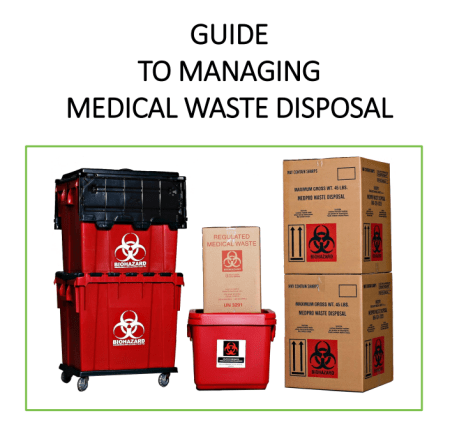Navigating Medical Garbage Disposal: Important Providers for Medical Care Facilities
In the detailed landscape of healthcare operations, the monitoring of medical waste is an important aspect that requires thorough focus. Healthcare centers, whether little facilities or huge health centers, are handed over with the duty of handling, treating, and getting rid of a broad array of medical waste streams. The complexities entailed in navigating with the governing demands, ensuring correct waste segregation, and implementing risk-free collection and transport procedures are critical. Understanding the important services that support medical waste disposal is not simply an issue of conformity yet also a fundamental component in securing public health and ecological well-being. The intricacies of this process are important for health care facilities, and the know-how used in this world plays a crucial duty in maintaining the integrity of healthcare systems.
Regulatory Compliance Support
For healthcare centers, making sure governing compliance support is necessary to maintain appropriate handling and disposal of medical waste. Following laws stated by organizations such as the Epa (EPA) and the Occupational Safety And Security and Wellness Administration (OSHA) is crucial to protect against environmental contamination, protect public health and wellness, and avoid potential lawful effects. Regulative compliance assistance offers medical care centers with guidance on exactly how to effectively set apart, shop, transport, and deal with numerous kinds of medical waste according to local, state, and federal policies. This assistance consists of support in developing and executing extensive waste administration strategies, conducting regular staff training sessions, and executing audits to make sure continuous conformity. By partnering with governing conformity specialists, healthcare centers can stay up-to-date on progressing regulations, reduce dangers associated with inappropriate garbage disposal, and inevitably add to a much safer and much more lasting environment for all.
Waste Partition Assistance

Health care facilities have to provide clear guidelines and training to team on just how to segregate waste efficiently. This consists of dividing general waste from hazardous materials such as sharps, infectious waste, pharmaceuticals, and chemical waste.
Collection and Transport Solutions

Appropriate collection and transport solutions are important elements of the clinical waste disposal process in health care facilities. These services make sure that unsafe materials are handled securely and in compliance with laws to secure both the look these up environment and public health and wellness. Healthcare facilities count on specialized waste administration business to supply effective collection and transportation solutions tailored to their needs.
Clinical waste collection includes segregating various types of waste at the point of generation, making use of color-coded bins or bags to identify in between general, unsafe, pharmaceutical, and various other waste streams. Trained workers have to do this task to avoid contamination and make certain correct disposal. Once accumulated, the waste is transferred in dedicated cars outfitted to handle hazardous materials safely. These automobiles stick to rigorous safety and security criteria and follow marked courses to licensed therapy facilities for disposal through techniques such as incineration, sanitation, or landfilling.
Treatment and Disposal Solutions
In the world of medical waste disposal for health care facilities, after the critical stage of collection and transport solutions, the emphasis shifts in the direction of executing efficient therapy and disposal remedies. Treatment remedies typically include processes such as autoclaving, which makes use of vapor under pressure to decontaminate the waste.
Disposal options include the last step in the medical waste administration procedure. Recycling and resource recovery are likewise getting grip as sustainable disposal options for specific kinds of medical waste materials.
Efficient treatment and disposal options are paramount in guaranteeing compliance with laws and securing public wellness and the setting. Medical care centers should carefully evaluate and choose suitable techniques that align with their waste management goals and sustainability initiatives.
Team Training and Education And Learning

To effectively manage clinical waste disposal in medical care centers, comprehensive team training and education play an important duty in making sure adherence to regulative needs and maintaining a safe environment. Proper training equips staff with the knowledge and abilities required to handle different kinds of medical waste, segregate them properly, and More hints package them safely for disposal. By enlightening employees on the dangers related to improper handling of clinical waste, centers can minimize the likelihood of crashes, contamination, and regulative infractions.

Conclusion
In conclusion, medical care facilities depend on important medical garbage disposal solutions to make sure regulatory conformity, appropriate waste segregation, safe collection and transportation, efficient treatment and disposal, as well as staff training and education. These solutions play a crucial role in keeping the wellness and safety of both healthcare employees and the public, highlighting the value of correct administration of clinical waste in health care setups.
For health care centers, making basics certain regulative compliance assistance is essential to keep correct handling and disposal of medical waste. Waste segregation includes classifying different types of medical waste to make sure suitable handling, treatment, and disposal. This includes dividing general waste from dangerous products such as sharps, transmittable waste, pharmaceuticals, and chemical waste.Medical waste collection entails segregating various kinds of waste at the factor of generation, making use of color-coded containers or bags to differentiate between general, hazardous, pharmaceutical, and other waste streams.In the world of clinical waste disposal for medical care facilities, after the important stage of collection and transportation services, the focus moves in the direction of implementing reliable therapy and disposal services.